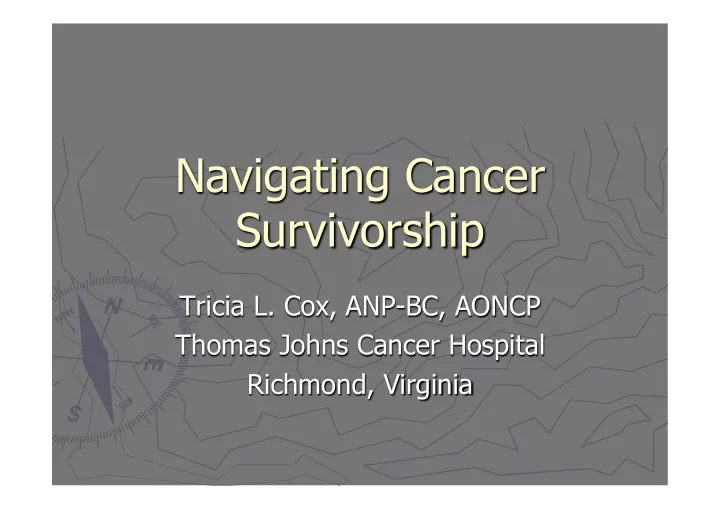

Navigating Cancer Survivorship Tricia L. Cox, ANP-BC, AONCP Thomas Johns Cancer Hospital Richmond, Virginia
Overview of Survivorship Navigation ► 2 nursing approaches to survivorship care § Navigate through to CS care § Enroll after active treatment complete ► Multiple institutional approaches! § Dependent on type and size of facility and community § Varies from one end of the spectrum to the other (marketing to MD, etc)
What Patients want: Multidisciplinary Team PCP/GYN Social Surgeon Services Genetic Counselor Radiologist Oncology Pathologist Nurses PATIENT Navigator Radiologist Plastic Medical Surgeon Oncology Supportive Radiation Services Oncology
What Administration Wants Return on Investment Diagnostic mammogram Referrals From Ultrasound Patients Referrals for Percutaneous Supportive biopsy care Screening mammogram Additional Surgical Radiographic Consult Imaging Medical Oncology/ Surgery Chemo Radiation Therapy
Cancer Trajectory Survivorship Dx Treatment Year 1 Year 2 Year 3 … Discharge 3 months 6 months 9 months 12 months Oncologist Follow Up Oncologist Follow Up Oncologist Follow Up Create Care Plan Oncologist Follow Up Pelvic Exam Bilateral Mammogram
Navigation Opportunities Outreach/Screening Diagnosis Treatment Survivorship Freeman, H. (2009). Patient navigation across the healthcare continuum. Retrieved March 20, 2010 from http://www.hpfreemanpni.org/patient- navigation/
Retrieved from http://www.hpfreemanpni.org/our-model/ on 7/26/2012
Navigation and Survivorship What is Navigation? What is Survivorship? ► Advocacy for patients ► Advocacy for patients ► Education on disease & ► Education on side effects, treatment late effects, monitoring and healthy living ► Communication between family, healthcare ► Communication between providers and patient family, healthcare providers and patient ► Referrals to resources and into survivorship ► Referrals to resources ► Assistance with ► Assistance with appointments appointments (follow-up)
Our Plan for Buy-in ► Pre-implementation ► Increase awareness of gaps ► Tell a story or two! ► Develop relationship(s) with key players ► Develop model for care delivery
Data from Livestrong 2006 The Advisory Board Company, Washington, DC
Most Common Survivorship Model Surgeon Radiation Patient Primary Care Oncologist Provider Medical Oncologist
Common Academic Medical Center Model Surgeon Primary Care Medical Provider Oncologist Survivorship Clinic Radiation Oncologist Patient
Our Community based Model Surgeon Patient Navigator Radiation Primary Care Oncologist Provider Medical Oncologist
Survivorship Navigation ► Nurse Practitioner Clinic ► Shared Space ► ARIA Scheduler ► Patients registered and Billable service
Our Process ► Radiation Therapy patients are referred into survivorship within the last week of treatment ► Lung and Head and neck are referred in by our Navigator ► Medical oncology and surgical oncology slowly referring patients
How it works ► Radiation therapy patients are referred into survivorship clinic after two weeks ► Lung and head and neck are referred in by the Navigator depending on their treatment and performance status
Implementation Start Breast Cancer Small Prostate Cancer Build on Successes Add Colorectal, Lung & Brain Work on Processes! Registration One hour appointment Written Care Plan provided at visit
Product Description ► Multiple products available, we chose this one… • Internet based • Nightly back up of data • Easy to use tabs or hypertext • “ Nurse-friendly ”
Four Domains of Survivorship Care ► Physical Well Being ► Social Well Being ► Psychosocial Well Being ► Spiritual Well Being
What was the greatest need identified in our survey of survivor ’ s needs at the end of treatment? 1. Psychosocial support 2. Financial assistance 3. Physical symptom management 4. Diet and exercise program
Assessment and Affecting Lifestyle Changes ► Assessment of survivors ’ needs post- treatment ► Diet and Exercise classes started § Utilize dietitian § Athletic trainers ► Chemo-Brain classes
Lessons Learned ► Start slow ► Allow time between each intervention ► Re-visit process ► Engage your physicians every step along the way ► From a mentor, “ Don ’ t let the perfect get in the way of the good. ”
Final Thoughts ► A breast cancer survivor brought her mother in for the CS visit, and tearfully said, “ I wish this had been available when I finished treatment. I have learned things today, and I am 7 years out. ” ► “ I found the session very informative. I feel in control of my future care. ”
Case Study ► 49 y.o. Caucasian female s/p ER/PR positive, HER-2/Neu negative breast cancer ► Stage II (T1, N1a, M0) chemotherapy ► Taxotere and cytoxan ► Radiation therapy ► Moved to this community 2 months prior to diagnosis and has no support system here ► Tearful and nervous during CS visit
What do you think? ► I like to approach with the 4 domains § Physical – What might we expect? § Psychological § Emotional § Spiritual
Questions?
Recommend
More recommend